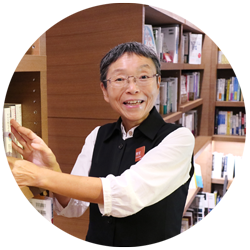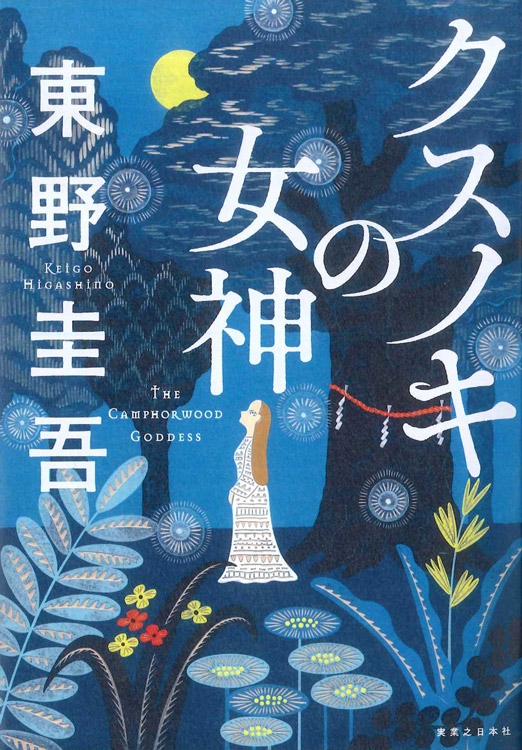[277th] Michiko Mamuro's bookshelf "The Goddess of the Camphor Tree" by Keigo Higashino / Jitsugyo no Nihonsha
Known as the "original charismatic bookseller," DAIKANYAMA TSUTAYA BOOKS, who recommends books in a variety of media including magazines and TV.
In this series, we take a peek into the "bookshelves" in the mind of our most popular concierge.
Please enjoy it along with his comments.
* * * * * * * *
"The Camphor Tree Goddess"
Keigo Higashino/Jitsugyo no Nihonsha
Click on the image to go to the purchase page.
Click on the image to go to the purchase page.
* * * * * * * *
This is the second installment of "The Guardian of the Camphor Tree," which was introduced in the 93rd installment of this column.
The main story revolves around the bumpy interactions between the protagonist, Reito, in his early twenties, who gets into a difficult situation after doing something wrong, and Chibune, a woman in her seventies (the chief advisor of one of Japan's leading companies, the Yanagisawa Group!), who suddenly appears and introduces herself as "your late mother's older sister." The story also follows the growth of Reito (whose words and personality are the epitome of a Reiwa man), who, at his aunt's request, takes up a job worthy of a Japanese folktale, that of "shrine tree keeper," and the mystery of "what camphor trees are."
In this book, the story begins with a high school girl appearing in front of Reito, who is busy cleaning the area around the torii gate in a work uniform, asking him to put a poetry collection at the shrine. It's a simple, simple production, printed on a printer and stapled together. Each one costs 200 yen.
But this place is only important to those who know the secret of the tree, and the locals just think of it as a convenient vacant lot. The place is rundown, there are almost no visitors, and they don't sell amulets or ofudas. Reito tries to refuse, but she has two siblings. The younger brother, who is about elementary school age and has a cheeky tone, bows his head, and the younger sister has sad eyes. And to be honest, the high school girl is a beautiful girl.
So I gave permission, but about a month later, a middle-aged man appeared and tried to run off with the poetry book without paying (he currently had 600 yen on hand. He said it would be tough to get through today and tomorrow with only 400 yen left!). Furthermore, a robbery and assault incident occurred in town.
Then, halfway through the story, a diary-like document titled "To Me Tomorrow" is inserted. It appears to have been written by a young boy. In addition to the events of the day, it includes portraits of people the author met and where they put things they bought, which makes you go "huh?" as you read it. Afterwards, everyone will gasp and say "Ah." It is troubling that the second-year junior high school boy in the diary and Senshu, who has retired from work, are in similar situations. This boy and the girl meet, and furthermore, the man who tried to steal the poetry book because he couldn't pay the 200 yen is connected to the victim who was hit over the head during a robbery.
What I like most about Chishu is how resolute she remains in the face of adversity, which is why the scene with the yellowtail and radish was so touching.
One night, she is helpless in the kitchen, facing a plate of fish and radish. Two days ago, Reito said, "I'm an ex-convict," but the former top advisor of a large company had told him, "You're not an ex-convict because you haven't been charged. It's fine to reflect on your foolish actions, but you shouldn't belittle yourself. Being servile is just self-indulgence." Now, Reito is whining, saying, "You're a completely useless old woman now," and "I'm nothing but a nuisance to you." Reito stands up.
Afterwards, while eating the delicious yellowtail and radish, Senshu mentions something. Her smile is sarcastic, and her words may not be sincere. But the elderly aunt shows her young nephew that she is looking forward again.
As I read, I thought that the past and the future are not something that are naturally brought to us by the passage of time, but something that we have to strive for. What you see when you look back without looking down is your own path. What lies ahead of you when you hold your head up straight is the future. The words of the story told by the Camphor Tree Goddess stay in our hearts after reading.
The main story revolves around the bumpy interactions between the protagonist, Reito, in his early twenties, who gets into a difficult situation after doing something wrong, and Chibune, a woman in her seventies (the chief advisor of one of Japan's leading companies, the Yanagisawa Group!), who suddenly appears and introduces herself as "your late mother's older sister." The story also follows the growth of Reito (whose words and personality are the epitome of a Reiwa man), who, at his aunt's request, takes up a job worthy of a Japanese folktale, that of "shrine tree keeper," and the mystery of "what camphor trees are."
In this book, the story begins with a high school girl appearing in front of Reito, who is busy cleaning the area around the torii gate in a work uniform, asking him to put a poetry collection at the shrine. It's a simple, simple production, printed on a printer and stapled together. Each one costs 200 yen.
But this place is only important to those who know the secret of the tree, and the locals just think of it as a convenient vacant lot. The place is rundown, there are almost no visitors, and they don't sell amulets or ofudas. Reito tries to refuse, but she has two siblings. The younger brother, who is about elementary school age and has a cheeky tone, bows his head, and the younger sister has sad eyes. And to be honest, the high school girl is a beautiful girl.
So I gave permission, but about a month later, a middle-aged man appeared and tried to run off with the poetry book without paying (he currently had 600 yen on hand. He said it would be tough to get through today and tomorrow with only 400 yen left!). Furthermore, a robbery and assault incident occurred in town.
Then, halfway through the story, a diary-like document titled "To Me Tomorrow" is inserted. It appears to have been written by a young boy. In addition to the events of the day, it includes portraits of people the author met and where they put things they bought, which makes you go "huh?" as you read it. Afterwards, everyone will gasp and say "Ah." It is troubling that the second-year junior high school boy in the diary and Senshu, who has retired from work, are in similar situations. This boy and the girl meet, and furthermore, the man who tried to steal the poetry book because he couldn't pay the 200 yen is connected to the victim who was hit over the head during a robbery.
What I like most about Chishu is how resolute she remains in the face of adversity, which is why the scene with the yellowtail and radish was so touching.
One night, she is helpless in the kitchen, facing a plate of fish and radish. Two days ago, Reito said, "I'm an ex-convict," but the former top advisor of a large company had told him, "You're not an ex-convict because you haven't been charged. It's fine to reflect on your foolish actions, but you shouldn't belittle yourself. Being servile is just self-indulgence." Now, Reito is whining, saying, "You're a completely useless old woman now," and "I'm nothing but a nuisance to you." Reito stands up.
Afterwards, while eating the delicious yellowtail and radish, Senshu mentions something. Her smile is sarcastic, and her words may not be sincere. But the elderly aunt shows her young nephew that she is looking forward again.
As I read, I thought that the past and the future are not something that are naturally brought to us by the passage of time, but something that we have to strive for. What you see when you look back without looking down is your own path. What lies ahead of you when you hold your head up straight is the future. The words of the story told by the Camphor Tree Goddess stay in our hearts after reading.
* * * * * * * *
(Redirects to Yahoo! Shopping)

DAIKANYAMA TSUTAYA BOOKS Literature Concierge
Michiko Mamuro
【profile】
"The original charismatic bookseller" who recommends books in various media such as magazines and TV. Has serials in magazines such as Fujingaho and Precious. Active as a book critic, her paperback reviews include "The Pale Horse" (Agatha Christie/Hayakawa Christie Bunko), "Motherhood" (Minato Kanae/Shincho Bunko), "The Snake Moon" (Sakuragi Shino/Futaba Bunko), and "Staph" (Michio Shusuke/Bunshun Bunko).
























